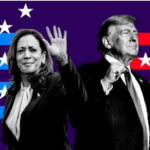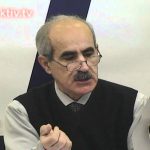
Elmar Chakhtakhtinski, chairman of Azerbaijani-Americans for Democracy (AZAD), gave an interview to Azerireport about his recent meeting with Matthew Bryza, the newly appointed US Ambassador to Baku.
Q: Azerireport has learned that you have met last Friday with the recently appointed US Ambassador to Azerbaijan, Matthew Bryza. What did you discuss?
Our discussion focused on the US support for democracy in Azerbaijan and the role the US Embassy in Baku plays in this process. I expressed the concerns of Azerbaijani-Americans and broader public about the deteriorating conditions in regards to human rights and basic freedoms in Azerbaijan and the need for a consistent and robust US policy in this regard.
Ambassador Bryza emphasized his strong commitment to the promotion of democratic development as one of the main pillars of the US foreign approach towards Azerbaijan. He highlighted the importance of programs that the US government funds in Azerbaijan, directed at building democratic and civic institutions, and said that he will work to ensure that these efforts continue. He also mentioned the vital role of the US Embassy in speaking out on behalf of the US government in defense of the rights of local dissidents, independent media, activists and NGOs and providing assistance to them in the capacity consistent with the diplomatic status of the Embassy.
Q: Do you think Ambassador Bryza will be an effective conduit of the US support for democracy in Azerbaijan?
He is definitely an experienced diplomat with an in-depth knowledge of the situation and the main players both within Azerbaijan as well as in the region around it. And now being appointed to a critical position of a US Ambassador in Baku, after having that post vacant for a year and half, he is very well positioned to make a valuable contribution to strengthening US support for democracy in Azerbaijan. Having an Ambassador in place should allow Washington to have a more direct communication channel with Baku, more reliable assessment of the situation, and help to realize US policy objectives in all areas, including the democratic development.
How effectively that will be done, of course, depends on how much priority the US policy makers in general and the US Embassy in Baku in particular place on the support for democracy. In my personal view, for the past eighteen years we saw varying approaches to this issue from different US Ambassadors in Baku. Of course, there are also some limitations to what the Embassy can do, as it’s primary tasks is to fulfill the US foreign policy objectives set by the leadership in Washington.
In my conversation with Ambassador Bryza, I sensed that he has an appreciation for both the difficult challenges in building democracy in Azerbaijan and the critical importance of this task for the US interests there. He pointed out that without visible progress in building open civil society and true market economy, any other gains, both in terms of Azerbaijan’s own development as well as the advancement of American interests there, can not be sustained in the long run.
We also touched upon the threats posed by political stagnation, widespread corruption and the limited avenues for open debate and expression of public’s concerns in authoritarian societies. Ambassador Bryza is well aware that such conditions can eventually lead to a “threshold” (as he aptly put it), beyond which violent outbursts of suppressed dissent from population can follow, often leading to extremist forces taking over.
Q: What are the specific gaps of the US policy towards democracy in Azerbaijan in your opinion?
There are several specific points that I brought to the attention of Ambassador Bryza during our discussion, which we think may help to strengthen US support for democratic development in Azerbaijan.
First of all, the United States needs to be more consistent in pushing for respect to human rights, basic individual freedoms and free and fair elections in Azerbaijan. US Department of State as well as the Embassy in Baku have been vocal in expressing concerns about imprisonment of journalists and persecution of dissidents, falsified elections and violence against peaceful protesters. However, since the democratic development is one of US priorities in Azerbaijan and the sustainability of gains in other areas depend on it, it would be more effective if all US officials, even those not specifically in-charge of democracy and human rights, would publicly raise these issues at every meeting with the Azerbaijani leaderships and in the statements made to media. And it is also as important not to let the specific issues to be forgotten after issuing initial statements of concern, but to keep them on agenda and continue to exert pressure until they are resolved.
Consistency is the only way to send a strong message to Baku that Washington is serious about democracy and human rights. An example of such persistence was demonstrated by the current administration in the case of the arrested bloggers, where all levels of US government, starting with the Embassy, to the State Department, all the way to Secretary Clinton and President Obama pressed for their release.
Support for democracy should be marked with concrete tangible objectives and milestones set out by the US government, as it is done in regards to security and energy cooperation. For example, in energy policy we know that the US and other Western governments went to great lengths in promoting Baku-Ceyhan pipeline and now are supporting the Nabucco gas project. On security front, we have Azerbaijani participation in NATO efforts in Afghanistan and providing access to the country’s airspace. These are very concrete objectives put before the Azerbaijani leadership by Western counterparts, with certain milestones and timelines specified. Democratic development can also be treated in a similar fashion: release of political prisoners, inclusion of opposition members in the election commissions on equal basis, re-opening of local radio frequencies for Radio Liberty and Voice of America broadcasts – these requests need to be raised before the officials in Baku as necessary elements, even prerequisites for good US-Azerbaijani relations. Of course, such policy approach would be possible only because all these initiatives are also vital to the interests of Azerbaijan and its people.
Finally, I would like to see a more pro-active approach in this area. Strong statements of concerns after attacks on demonstrators and dissidents, or rigged elections are important, and coming from the US leadership they really do matter. However, often these abuses by the authorities can be seen coming well-ahead, and the Western governments can issue assessments, raise concerns and publicly demand corrections to the course of events from the Azerbaijani leadership, consistent with the country’s international obligations, before the critical events occur, while there is still time to affect change. For example, during the last parliamentary elections it was obvious during the pre-election period that they will neither be fair nor free due to severe restrictions on placed on public gatherings, government’s refusal to register a big portion of opposition candidates and the composition of election commissions (Azerireport).


